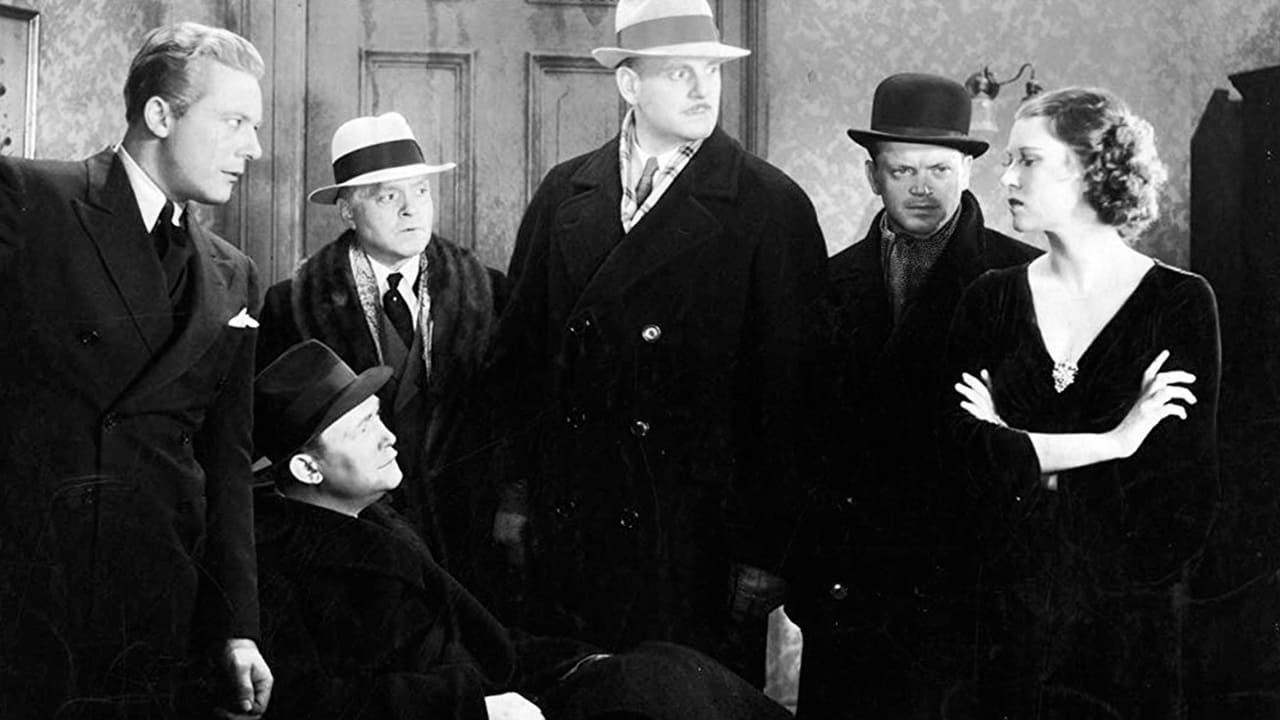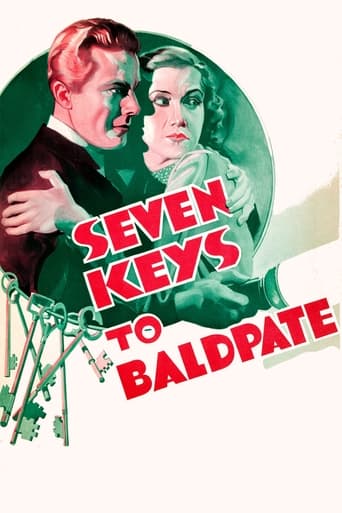Clarissa Mora
The tone of this movie is interesting -- the stakes are both dramatic and high, but it's balanced with a lot of fun, tongue and cheek dialogue.
Patience Watson
One of those movie experiences that is so good it makes you realize you've been grading everything else on a curve.
Deanna
There are moments in this movie where the great movie it could've been peek out... They're fleeting, here, but they're worth savoring, and they happen often enough to make it worth your while.
Edwin
The storyline feels a little thin and moth-eaten in parts but this sequel is plenty of fun.
binapiraeus
One of Earl Derr Biggers' most popular novels (which had been turned into a play by George M. Cohan), "Seven Keys to Baldpate" was adapted for the screen no less than six times; this was the fifth time. And although the movie admittedly can't reach the REALLY high class of the famous 1917 version, where Cohan himself played the leading role, and after more than 20 years the story may already seem a little bit worn-out and much-used, it's nonetheless hilariously lively, funny and at the same time pretty suspenseful, with a neat cast (especially Gene Raymond as the fearless, wisecracking novelist) and an unusual, but really successfully balanced mix of - a gangster movie and a 'Dark Old House' mystery! The story has been altered a bit, and the supporting characters get more space for all kinds of jokes (especially the women-hater, 'hermit' Henry Travers); and the gangsters' slang and tough guy attitude make a wonderfully strange contrast to the cool and clever ways of the young novelist - and of course, to the classic settings with secret panels, candle-light and groaning staircases...With a running time of just a little more than an hour, this movie nicely keeps a good pace and leaves no room for boredom; great entertainment for lovers of the genre!
the_bernie
There are several film versions of this George M. Cohan play based on a novel by Earl Derr Biggers the writer of Charlie Chan novels.I only read part of the book but this play starts out with much of the book thrown in. as we see a lady (Margaret Callahan) crying in the waiting room and being discussed by a male passenger (Gene Raymond) and the station agent (Walter Brennan.) The story is of a writer who picks Baldpate Inn, a quiet place, closed for the winter, as an ideal place for writing a quick novel. He is given the "only key" to the Inn. The film slowly unfolds and makes you wonder why you are watching. Soon it picks up the pace as we find "Seven Keys to Baldpate" and discover who has them both the characters and the familiar actors of the time. It takes time getting used to the cavalier attitude of the writer.
tedg
Don't read this comment if you don't want spoilers for the film "Identity," (as well as for this film).There's a narrative device that I like a lot. It may have originated in the play that this film is based on. I think there may be a half dozen other versions and a couple dozen derivative versions. Its the notion that all the characters you see are invented in one mind as a sort of lucid dream that we witness. In the usual embodiment, at the end this is revealed. Alas, here that bit is left off.But in the basic version, a writer arranges to stay at a remote lodge, named "baldpate." He's alone and has the only key. His mission is to write a crime novel in 24 hours.Right there you have three clues. The first is that the lodge's name is head-related. Obviously, what we will see will be the novel as it is being written. In one case, a character is literally told what his name will be. (This notion was used obliquely in "The Shining.")As in "Identity" there's a business with keys. He has the only key to the place. But six other characters enter, and they have the only key as well!At the time this was written, there was the notion in popular psychology that the human mind consisted of seven personalities that needed to be harmonized. Jung would later take this largely superstitious notion into more acceptable notions. But that's where Biggers got the idea (in his story) that Cohan dramatized. Cohan's version had the writer as a wisecracking observer, partly inside the mystery, partly outside. This is a boring movie. But it and its predecessors are key milestones in narrative devices that dominate what we watch today.Ted's Evaluation -- 2 of 3: Has some interesting elements.
F Gwynplaine MacIntyre
George M Cohan's success as a songwriter and performer has obscured the fact that he also wrote or co-wrote many plays, most of which were very successful in their day. But Cohan's plays have dated badly. He relied heavily on one very contrived device. Most of Cohan's plays feature a wide assortment of very old-fashioned stock characters, contrasted with a wise-cracking slang-slinging protagonist (often played by Cohan himself) who speaks directly to the audience, and who comments on the stiffness of all the other characters in the cast.'Seven Keys to Baldpate', which Cohan adapted from a novel by Earl Derr Biggers -- now remembered as the creator of Charlie Chan -- is the only Cohan play which is still revived with any frequency. Even this one is squeaky and creaky. The story has been filmed (to date) *seven* times under its original title, with some disguised remakes such as 'House of Long Shadows' and Gene Wilder's wretched 'Haunted Honeymoon' (which ripped off its one and only funny gag from the unjustly obscure comedy 'Murder, He Says').This 1935 edition is probably the best film version, which isn't saying much. It modernises the material somewhat, deviating significantly from Cohan's original play. Gene Raymond portrays a novelist who comes to the old abandoned Baldpate Inn so as to get some peace and quiet while he writes a novel. He expects to be left alone because he possesses the one and only key to Baldpate ... so nobody else can get in. But then a succession of oddball characters show up, each one weirder than the last ... and each one possesses what he or she claims is the one and only key to Baldpate.There's a 'surprise' ending that's quite obvious, especially if you've seen 'Haunted Honeymoon'. The best performance in this 1935 movie is by Henry Travers, as a crusty hermit who's misogynistic with it, and who is busy writing a manuscript denouncing womankind. 'Hey, mister!' he shouts, interrupting just as Gene Raymond is about to smooch bland leading lady Margaret Callahan. 'If I start a sentence with the word 'women', do I *hafta* use a capital W?' That's a typical example of the weak humour on offer here.Cohan's original play ended with a startling piece of meta-fiction, a coup de theatre in which we learn that the events we've just witnessed are actually the contents of the novelist's manuscript, which he has already written. It would have been an improvement if this 1935 film version had attempted something like that, instead of the flat obvious ending which this movie has. I'll rate it 3 out of 10, mostly for its fine cast of supporting actors.

